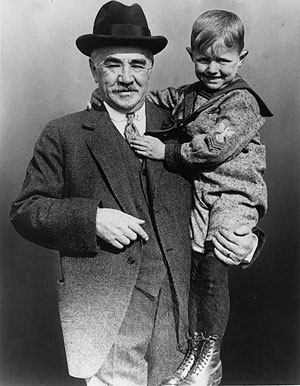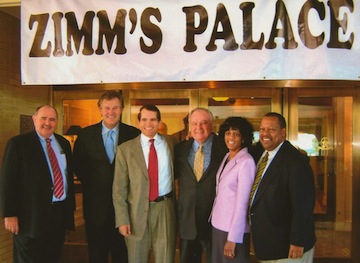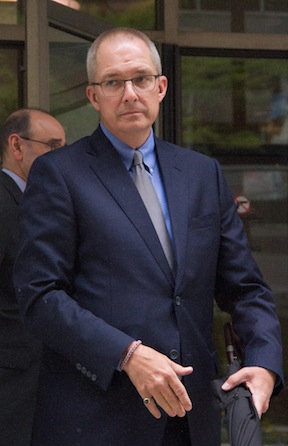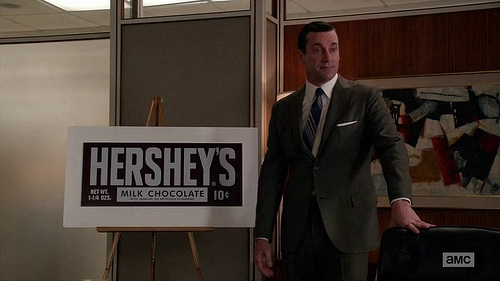The DNA of the Hershey chocolate company holds something that can’t be measured on ledger sheets
Mondelēz’s recent offer to buy Hershey Foods is not so much a measure of the monetary worth of a company, so much as it is as a measure of the political and moral decline of Pennsylvania.
Last week Mondelēz International, maker of Oreo cookies and Ritz crackers, bid $23 billion, or $107 a share, to buy the Hershey chocolate company.
Economists are fond of saying that all things in this world have a monetary value, and everything and everyone has a price. That premise again will be tested with the latest offer to buy Hershey Foods.
Unfortunately for Mondelēz and the economists, the DNA of the Hershey chocolate company holds something that can’t be measured on ledger sheets.
“Mr. Hershey’s approach was to take kids one at a time off the streets, with his bare hands, and love them and care for them,” Bob Reese, descendant of the inventor of the peanut butter cup that bears his name, and family friend of Hershey, once explained to me.
And as one hit television series recently told its viewers, “Hershey’s is the currency of affection. It’s the childhood symbol of love.”
But can love and affection forever fend off an onslaught from the Almighty dollar — particularly in a politically corrupt environment like Pennsylvania’s?
If the Mondelēz bid fails, stock analysts say, it may pave the way for even larger and perhaps more irresistible hostile takeover bids from other multinationals, like Nestlé, or Mars.
Sooner or later all that will stand in the way of a sale of Milton Hershey’s chocolate company are vigilant, good-hearted, and honest Pennsylvania officials and judges.
And that’s a problem, because Pennsylvania government and courts continue to sink deeper into a morass of self-serving corruption and dishonesty.
As Milton Hershey’s storied chocolate company again goes on the block, it’s worth remembering Milton Hershey’s intent.
Hershey was motivated not so much by the Almighty Dollar, but by the Real Almighty — his religious Mennonite upbringing.
Those who knew the man memorialized him at his death in 1945 as one “whose life and work were devoted to service for others, who lived by the Ten Commandments and the Golden Rule, and whose entire estate was generously given for the care and training of orphan boys, for the education of the youth of his community, and for the general welfare of all.”
Cagey businessman that he was, Milton Hershey also understood the economists’ Golden Rule, much better than they understood Hershey: “He who has the Gold, makes the Rules.”
Almost one hundred years ago, in 1918, Hershey gifted all his stock and controlling interest of the chocolate company to the Trust running the orphans’ school.
Some have been trying to pry the hugely profitable chocolate company from the Trust ever since.
Bob Reese sighs when he says, “It lasted 100 years. One hundred years wasn’t bad.”
Fortune magazine this week tried to explain to befuddled investors, “The fiduciary duty of the Trust, laid out in a 1909 deed, is to support the Milton Hershey School, an establishment created for children from low-income families, not Hershey’s shareholders.”
The biggest threat so far to a school-owned chocolate company came in 2002, when the Trust’s board revealed plans to sell Hershey Foods to Wrigley, for $12.5 billion. (Notice that this week’s $23 billion bid from Mondelēz almost doubles that.)
A community uproar in 2002 spurred state Attorney General Mike Fisher, who was running for governor that year, to petition the orphan’s court to stop the sale. Ten of the 17 Trust members soon found themselves removed from the board, including all seven members who voted to sell the chocolate company.
”One of the biggest problems that came out of the sale process was the very severe fracturing of relations between the trust and Hershey Foods,” First Deputy Attorney General Jerry Pappert told The New York Times in 2002. ”The attorney general and the Orphan’s Court both felt strongly that we need to act to restore relations between Mr. Hershey’s trust and his food company and his school.”
Orphan’s Court Judge Warren Morgan further criticized the Trust’s board for ignoring Milton Hershey’s philanthropic desire for the candy company to benefit the orphans’ school.
AG Fisher soon packed the Trust with four new members. The board ultimately voted to decline Wrigley’s offer.
But there was a devil’s bargain to pay for the Pennsylvania attorney general’s political intervention.
One of the new board members was former GOP Attorney General Leroy Zimmerman. By all accounts, the Hershey Trust accelerated down a path of political patronage.
Sharp-elbowed state politicians soon jockeyed for representation on the Trust board, with perks that include chocolate spa treatments and high six-figure salaries.
Gov. Ed Rendell demanded his own representation on the board. Rendell’s trusted aide and former chief of staff John Estey became counsel and officer of the Trust.
Mondelēz’s recent offer to buy Hershey Foods then is not so much a measure of the monetary worth of a company, so much as it is as a measure of the political and moral decline of the Commonwealth of Pennsylvania.
As with the 2002 Wrigley offer, a serious corporate takeover bid can only be stopped by a strong and caring attorney general’s office and court system.
But both government institutions these days are troubled in Pennsylvania.
A distracted AG Kathleen Kane goes on trial in August for allegedly leaking a news story to the Philadelphia Daily News.
And the state court system is hardly strong and morally upright.
Pennsylvania’s courts currently are enmeshed in a porno email scandal that caused the sacking of two Supreme Court justices. State judges today seem more interested in fixing a failed referendum vote that would change the constitution to allow them to stay on the bench for five more years.
What about Ed Rendell’s former top aide, John Estey, who won a lucrative patronage plum at the Hershey Trust? Estey was arrested a few months back for stealing $13,000 from an undercover FBI sting.
The Trust board faces other turmoil, with several vacancies. Hershey’s school seems in constant upheaval, and neglect.
In the intervening years since the 2002 Wrigley buy-out offer, moreover, Pennsylvania has been rocked by horrendous child abuse scandals. Thousands of kids were sold down the river to private detention facilities by bribed state judges in the Cash for Kids scandal. An unknown number of kids were raped by former Penn State coach Jerry Sandusky, who ran the Second Mile charity for disadvantaged kids. (There have been similar allegations of the rape children at the Milton Hershey school, and in Catholic dioceses around the state.)
The state legislature has yet to conduct a single hearing on these horrendous crimes against Pennsylvania children.
So the political environment in Pennsylvania these days is quite a bit removed from Milton Hershey’s day.
All this seems like a puzzle to the financial press outside Pennsylvania, which is attempting to read the tea leaves with last week’s hostile take over bid by Mondelēz.
Financial reporters cling to the hope that this time, or some time in the future, the state AG may be distracted, and officials and courts may not care to fight the good fight for the kids at Hershey, or Milton Hershey’s legacy.
But the national financial press is challenged to explain all this, and what investors may expect in Pennsylvania. The attempted explanations are garbled.
“The current AG in Pennsylvania, Kathleen Kane, is set to go on trial next month for allegedly leaking lewd and bigoted emails between prosecutors and judges to a reporter,” Fortune attempted to explain to its readers this week, for example.
To talk about Milton Hershey and how he cared about kids, and not profits, seems like speaking a foreign language in today’s Pennsylvania, and in today’s corporate press.
Even so, one corporate media outlet got it almost right.
In a 2013 episode of the TV series Mad Men, advertising man Don Draper made a pitch to Hershey executives to handle the chocolate company’s advertising.
Draper tells the Hershey execs, “Hershey’s is the currency of affection. It’s the childhood symbol of love.”
Draper tells them that as a boy he would mow the lawn, and afterwards his father would take him to the corner drugstore, tussle his hair, and buy him a Hershey bar.
“Well weren’t you a lucky little boy?” one of the Hershey execs tells him.
But then we see Don Draper’s hand trembling. He undergoes a cathartic crisis.
He tells the Hershey executives he’s lying. There was no small town lawn. There was no father, no loving hair tussle, no corner drugstore.
Draper lifts his head and tells them, “I was an orphan. I grew up in Pennsylvania — in a whorehouse. I read about Milton Hershey and his school in Coronet magazine or some other crap the girls left by the toilet.
“And I read that some orphans had a different life there. I could picture it. I dreamt of it — of being wanted. Because the woman who was forced to raise me would look at me every day like she hoped I would disappear.
“Closest I got to feeling wanted was from a girl who made me go through her john’s pockets while they screwed. If I collected more than a dollar, she’d buy me a Hershey bar. And I would eat it alone in my room with great ceremony… feeling like a normal kid.”
“Do you want to advertise that?” a shocked Hershey man asks him.
“If I had my way, you would never advertise. You shouldn’t have someone like me telling that boy what a Hershey bar is,” Draper tells him. “He already knows.”
With that, in the television show, Don Draper loses the Hershey account.
In real life, if Milton Hershey had been in the room with Don Draper, I think things would have gone differently.
Milton Hershey would have understood Draper’s longing as an orphan boy for love, and a secure place to be loved.
Milton Hershey would understand the orphan in Don Draper. He would put his arm around him, and offer to take him back to Hershey, PA.
I like to think that Milton Hershey would put his arm around us all, and take us all back to Hershey.






What a great piece you wrote Bill…….As a kid, I grew up near the Milton Hershey School. I later played hockey with some guys from the school.
I have known 3 presidents from the MHS and had one as a neighbor, one as the father of my close friend… and socialized with (others). Nothing and no one is perfect- but the idea of this triad in Hershey to support the MHS is an incredible design.
But like you mentioned, a pile of 12 billion as an endowment brings out every vulture and every evil temptation a man could face.
Awesome article. Didn’t know any of this
Source documents make clear that all of the current Managers are complicit in their ongoing intentional violation of the 2013 Agreement, abuse of the Hershey Trust, and defiance and further acts of marginalizing the authority of the PA OAG. The PA OAG’s decades of continued failure to remedy this calls into question whether the PA OAG career politicians will fulfill their oaths of office and their role as parens patriae (protector of the public), particularly when it comes to protecting children and their rights.
All Managers must be removed and permanent reform implemented consisted with Milton Hershey’s original intent.
We believe that Mark A. Pacella, Chief Deputy Attorney General, Charitable Trusts and Organizations Section, is well aware of this and will recommend such permanent reform. After all, the Managers have been intentionally violating the 2013 Agreement, abusing the Hershey Trust, and defiant of the authority of the PA OAG.
So the only open question is: what will the career politicians do with Chief Deputy Pacella’s recommendation for permanent reform? If the career politicians don’t implement permanent reform consistent with Milton Hershey’s original intent, Pennsylvania citizens must repeal the parens patriae concept as being nothing more than a truly “legal fiction”.
/s/ United Orphan Army
Fortunately for me, it was my “home” when Mr. Hershey was still living; and he ran things just as he wanted them!
So different now. I used to take pride in telling people I graduated from HIS (Hershey Industrial School, as it was called then). Now I am not so ready to advertise it.
After the current Deputy Director of the AG,who seems to be creating some much needed reforms, I may be able to again!
Bill, your article is informative and well written as usual! However, like so many others, you failed to write about all the children raped by pedophiles at MHS and by priests in the Philadelphia Archdiocese during the same time period Sandusky was raping children in State College. These rapists, like Sandusky, were reported years before they were arrested and brought to justice and we must ask — WHY?
Bill,
It would make the piece stronger if Jerry Sandusky was associated with The Second Mile charity because charities are allegedly overseen by the Office of Attorney General.
Please consider that change.
Thanks,
Ray
The Charles Koons case at MHS had cover-up written all over it.
http://www.philly.com/philly/news/homepage/94387849.html
Several boys complained to regular house parents about Koons in the 1980s, according to police documents. The mother of one of those boys sent a sworn statement to the Derry Township Police Department about a molestation in 1998. An investigation was launched in March 1998, and the school was contacted, according to an internal police report of the investigation.